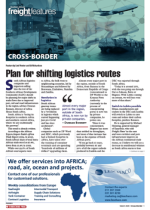Streamlining cross-border road freight could be the key to unlocking Africa’s economic potential, according to Pamela Devadas, export manager at Turners Shipping.Logistics costs are significantly impacted by the challenges faced by the industry, inhibiting economic growth and rendering small and medium-sized businesses unable to compete at an international level.“Road freight underpins imports and exports, with landlocked countries predominantly reliant on road freight, so understanding the dynamics of cross-border cargo movements and finding solutions to the many challenges is essential for Africa’s economic growth and development.”Natural resources, agricultural products and raw materials make up the bulk of export commodities, while imports are mainly manufactured goods and consumer products.In addition to increasing fuel prices and poorly maintained road infrastructure, Devadas says there are other, more pressing challenges faced by road freight operators. Chief among them are the delays at border crossings due to inefficiencies and bloated bureaucracy, and security while out on the roads.“The lack of funds is often cited when confronting these problems, especially infrastructure. However, one of the challenges which could be addressed without a high price tag is the frustrating border and customs procedures at certain borders where each country has its own system and requirements.”Trucks can be stuck for days waiting to be cleared due to inefficient customs processes and inconsistent regulations. These delays not only raise costs but also undermine the reliability of supply chains.“Many African countries operate in isolation, each with its own set of laws and regulations. “For example, in the Democratic Republic of the Congo, importers must obtain a FERI Certificate (Fiche Electronique de Renseignement à l’importation) before goods can be brought into or pass through the country,” explains Alicia Singh, export operations manager at Turners Shipping. According to Singh, operators need to remain abreast of statutory requirements and to be sufficiently agile to react to changes in legislation.Some countries have adopted digital systems which speed up customs procedures, reduce delays, and improve transparency. Despite these advancements, standardisation remains a challenge.A key development in improving cross-border cargo movements was the creation of the African Continental Free Trade Area (AfCFTA).Much of its focus is on economics, reducing tariffs and removing non-tariff barriers to trade, but there is a push to speed up the full harmonisation of border and customs regulations. Progress is being hampered by inconsistent enforcement, lack of infrastructure, and political will.Security of personnel and equipment remains a challenge for road freight operators, from hijacking to theft from vehicles, political unrest to military conf lict. The disputed elections in Mozambique are a recent example of how local unrest can have a devastating impact on one of the subcontinent’s busiest transport routes.“For now, logistics managers have to find solutions and workarounds for their clients while taking into consideration and even anticipating the challenges that may arise.” ER

